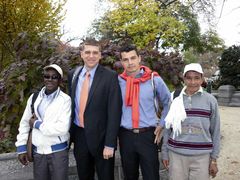
Bernardo Vivas (CAVIDA), Jacobo Blickenov (PBI), Fabian Laverde (COS-PACC) and Álvaro Manzano (ACVC) on tour in the US.
In November 2009, the offices of the PBI country group in the United States (PBI USA) and the office representing PBI Colombia in Washington, D.C., joined forces to organise a speaker’s tour to visibilise the risks faced by communities in resistance and some of the organisations accompanied by PBI in different regions of Colombia. In this respect, these two offices decided to invite the Cacarica Community for Self-Determination, Life and Dignity (CAVIDA), the Peasant Farmers’ Association of the Cimitarra River Valley (ACVC), and the Social Corporation for Community Advisory and Training Services (COS-PACC), to visit United States to share their stories and present their organisations’ projects and self-protection mechanisms.
During the speaker’s tour, which took place from 9 to 23 November, Bernardo Vivas (CAVIDA), Fabián Laverde (COS-PACC), and Álvaro Manzano (ACVC), visited the capital of the United States, Washington D.C., and the states of North Carolina, South Carolina, and Georgia. While there, they had the chance to present their situation before members of Congress, officials from the Department of Labour, the Inter-American Commission on Human Rights and at public events hosted by organisations allied with PBI, such as the Washington Office on Latin America (WOLA). During their visit they also had interviews with national print and radio media and gave presentations at American University, the University of North Carolina, and the University of South Carolina.
«It is very important that people from the US listen to the voices of hte people that have to live the reality of the policies and agreements made between the governments of the US and Colombia», stated Katherine Hughes-Fraitekh, executive director of PBI USA. «These organisations are trying to live in harmony with humanity and the environment, despite having to survive in the midst of a conflict. The problems they must face are shared by millions of persons throughout the world. This is why we want to invite them here in order to learn about the reality of their lives, their resistance, and their ongoing struggle for peace and justice».
School of the Americas
At the end of the speaker’s tour, the participants attended the annual vigil in front of the School of the Americas, located at the Fort Benning military base in Columbus, Georgia. Every year, approximately 20,000 persons attend this event to commemorate the deaths of eight persons —among them, six Jesuit priests—, who were murdered in El Salvador by Salvadoran soldiers trained at the School of the Americas. The participants on the speaker’s tour gave a workshop on self-protection mechanisms and also spoke on the event’s main stage.
The visitors stressed the impact of being able to give their speeches and share their experiences with other victims of soldiers who graduated from this training programme sponsored by the US government. For Fabián Laverde, «it was gratifying to participate at this vigil in front of the School of the Americas. I also believe it was politically beneficial since it was possible to vindicate the good name of the victims of the dirty war existing in the region, a war perpetuated by the actions or omission of the 16th Army Brigade, most of the commanders of which have been trained at the School of the Americas».
Through this speaker’s tour, PBI tried to provide a space for these organisations to explain and visibilise the reality experienced by Afro-Colombian, peasant and indigenous communities. Moreover, PBI tried to create space for these organisations to share with social movements in United States. Álvaro Manzano noted that in addition to showing interest in listening to their stories, the US organisations «showed their commitment to work hand in hand and continue to move forward with us so one day we may all share a better world».
Testimonies
Although they come from different regions of Colombia, all of the organisations shared similar concerns regarding the connection between economic interests in their regions and systematic human rights violations.
Bernardo Vivas, CAVIDA representative, stressed CAVIDA’s concerns for the possible implementation of large-scale infrastructure projects in the Cacarica River Basin. «Presently, there are 4.5 million forcibly displaced persons in our country. Projects such as the Pan-American Highway and the energy network would generate even more displacement because they pass through our territories», stated Vivas. «Only 1.5 percent of the persons who have been forcibly displaced have been able to return to their land. For CAVIDA, this was possible due to the creation of Humanitarian and Biodiversity Zones, which allow us to protect human life and nature through national and international accompaniment from such organisations as the Inter-Church Justice and Peace Commission and Peace Brigades International».
Fabián Laverde, member of COS-PACC, shared the experience of peasant and indigenous communities in the department of Casanare, a centre of oil exploitation by the British Petroleum Company. «For over twenty years, this multinational has heavily deteriorated the environment and the regional culture, causing peasants to lose their agricultural work and employ themselves in different oil activities, which has created a food crisis». Furthermore, Laverde stressed the connection between this crisis and US foreign policy. «At the end of the Second World War, United States turned the issue of oil in the world into a question of national security. Most of the oil extracted from Casanare is taken to United States to satisfy the high energy demand. This situation has meant thousands of forcibly disappeared persons, forced displacement, and dozens of cases of extrajudicial executions».
Álvaro Manzano, representing the ACVC, explained the harmful effects of fumigations in the area where his organisation works. «Besides the damage caused by the fumigations, there is also a major risk of displacement. As peasants, we realise we do not have the guarantees to prevent displacement. The Peasant Farmer Reserve Zone, an important mechanism to avoid displacement in the future, has also not been recognised. For a long time, we peasants have been proposing policies for the substitution of illicit crops».
